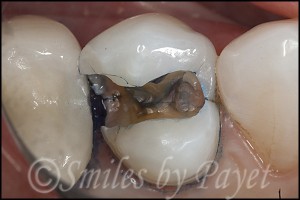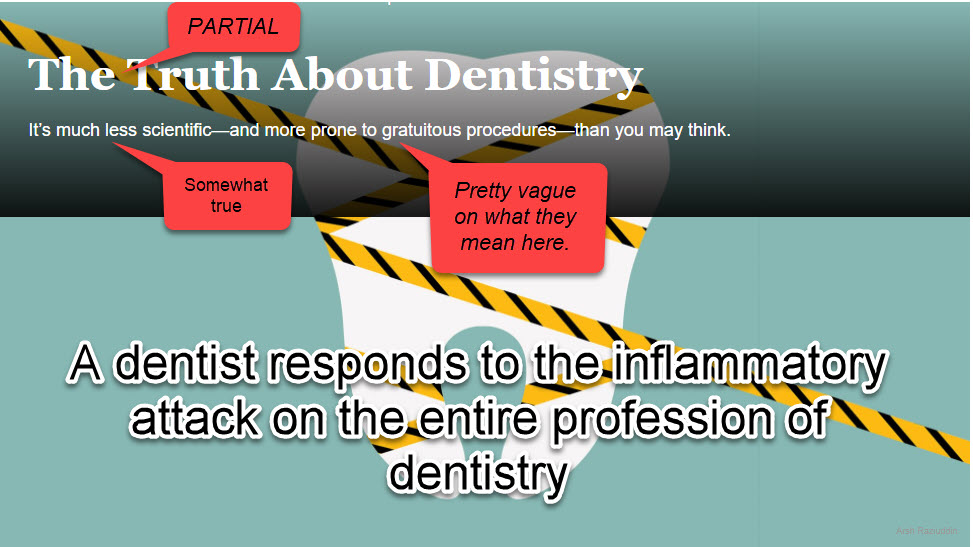I’ve practiced dentistry in Charlotte since 1998, and this question keeps popping up. I even addressed the topic directly before: Whom Do You Trust? Why? Do You Trust Your Dentist? The newest attack on dentistry & trust in our profession comes in an article in The Atlantic: “The Truth about Dentistry.” Is there some truth in it? Yes, but they left a ton of stuff out. 🙁
That’s why I blog, to provide some balance. To help you understand what’s real, what’s bullshit, and what they aren’t telling you. Check out the list of related earlier topics I’ve covered at the end of this article. For now, let’s dive into what this article on dentistry gets right…and wrong.
Are There Unethical Dentists? Duh.
 Ever seen a Bell curve graph? Of course, pretty much everyone has. It show the distribution of probabilities for almost anything you want to graph. It applies to honesty in every field, including dentistry. Some dentists are always ethical and honest. Most dentists are ethical and honest most of the time. Some dentists are never ethical or honest. The curve also applies to the skill and knowledge levels for dentists. The same goes for physicians, lawyers, politicians, plumbers, home builders, contractors, teachers, etc., but hey – when was the last time you saw an article in The Atlantic about “The Truth about Home Builders?” (OK, I didn’t check – was there one?)
Ever seen a Bell curve graph? Of course, pretty much everyone has. It show the distribution of probabilities for almost anything you want to graph. It applies to honesty in every field, including dentistry. Some dentists are always ethical and honest. Most dentists are ethical and honest most of the time. Some dentists are never ethical or honest. The curve also applies to the skill and knowledge levels for dentists. The same goes for physicians, lawyers, politicians, plumbers, home builders, contractors, teachers, etc., but hey – when was the last time you saw an article in The Atlantic about “The Truth about Home Builders?” (OK, I didn’t check – was there one?)
So yes, there are some unethical dentists, and the author of The Atlantic’s article seems to have found a really awful one. There are certainly more. The good news is that such dentists are a minority. That author sure tries to paint the entire profession in a bad way though, doesn’t he?
So how do you tell the difference? This is a legitimate problem. After all, it’s not like you can look in your own mouth. You don’t know the difference between a tooth-colored filling that’s done well or done badly. How do you know where the line should be between needing a filling or a crown? What are the pros and cons of a bridge vs and implant? Should you spend the money to save a tooth, or is replacing it a better value? How the hell are you supposed to make an informed decision?
That doesn’t even begin to cover how complicated it gets when choosing among dentures, implant-supported dentures, All-on-4 hybrid dentures, etc.
What The Atlantic Article Got Right

The Atlantic’s article hit on some truths that need to be acknowledged and addressed by our profession as a whole. In fact, acknowledging and understanding those truths can help you be confident in your dentist, or tip you off to getting a second opinion.
Good Dental Research is Lacking – For Good Reasons
Have you ever thought about how brutal an environment the mouth is? Every time you eat, your jaw muscles exert 175-265 pounds of force to chew your food. Hundreds and thousands of times per day, every day, for decades. Soft foods, hard foods, sticky foods, acidic foods, alkaline foods. For many people, a lot of crap food that’s high in sugar that bacteria just LOVE. Hot and cold foods & drinks put your teeth through hundreds of heating and cooling cycles a day. And then there is your saliva – no matter what we use to fix teeth, it’s constantly wet. Guess what? When you subject materials to gazillions of cycles of hot, cold, intense pressure and they’re wet almost 100% of the time, THEY BREAK DOWN. As I always remind patients:
We still haven’t discovered anything better for teeth than your own enamel, and if that doesn’t last your whole life, nothing I do will last forever either.
Then there are medications & medical conditions that dry up your saliva, which is critical to dental health. It buffers the pH of everything you eat and drink; it begins the process of digestion; it lubricates your food, making it easier to chew and swallow; it even has antibodies that protect your mouth from infection. Next imagine it drastically decreased or gone because of medications or medical conditions and imagine how that changes all the other things I already described.
Finally, imagine trying to design research to simulate all of that!
BTW, those are also many of the reasons why there is no vaccine against cavities, nor a sealant to permanently protect teeth, nor a way to grow enamel. I wrote plenty about that here. It’s just ridiculously difficult.
Yes, Standardization is Lacking
The Atlantic’s author is correct: there isn’t much standardization in dental care. There are simply too many variables! Every day, dentists have to think about these questions. To complicate it, we have to answer them based on individual patients and their situation:
- Are silver fillings or composite resin (tooth-colored) fillings better?
- When is a crown better than a filling?
- Do teeth with cracks need to be fixed or left alone?
- How long will a small filling last compared to a crown? How long with a big filling last compared to a crown?
- Which tooth-colored filling materials last longest, stain least, bond strongest?
- Which porcelains last longest?
- Is gold better than porcelain for a crown?
- If a $250 filling lasts 5 years but a $1,000 crown lasts 20 years, do you want to get a $250 filling 4 times or the $1000 crown 1 time?
- What if a $250 filling lasts 10 years but the $1,000 crown lasts 30 years?
- What if the $250 filling on a front tooth lasts 10 years but gets stained with coffee & wine in 3 years, while the $1000 crown also lasts 10 years but looks great the entire time?
- What if the dentist isn’t very good at tooth-colored fillings (they’re more sensitive to technique) but amazing at crowns?
- How much does it matter if the patient takes great care of their teeth or lousy care?
- If a person has a lot of teeth in bad shape, is it better to fix 2 teeth ideally with crowns for $2,000 (just an assumption for the moment) or do 10 teeth with fillings for the same amount, even if more of them really need crowns?
If you notice, that’s 13 questions about just fillings & crowns. I didn’t even touch root canals, gum disease, dental implants, gum grafting, teeth grinding, jaw pain, trauma from accidents…..

Take a look at this tooth and tell me – filling or crown? If filling, what kind? If crown, what kind? Which will last longer? Which will keep the tooth from splitting in 1/2 better? How likely is this tooth to split if it gets a filling? Why? What else needs to be done to prevent that besides fixing the tooth? Why did the tooth crack like this, since it already had a filling?
Dentistry is complicated, and there are no standard answers to answer all those questions.
It sucks, because we don’t even have a way to simplify or standardize it.
What The Atlantic Screwed Up
So yeah, there are real problems within the dental profession, but now I’m going to tell you what pisses me off about their article. IMO they did the public a real disservice with their article. I also recommend a great write-up by my colleague, Dr. Alan Mead, on why The Atlantic’s article was basically click-bait.
The Lack of Standardisation Makes It Hard for Us, too
Being a dentist is a damn hard job on the best of days. All the variables I described above make it really difficult for us to advise our patients. The more knowledge and skill a dentist has, and the more services they offer, make it even more challenging to explain all of the options to patients. Modern technology and materials have opened the doors to a wide range of new treatments for patients. There are courses to teach us how to use the new materials and technology, but they aren’t all of equal quality either. Some institutes are very conscientious and do their best to be rigorous in teaching; some aren’t. Some instructors are amazing teachers; some aren’t. Sound familiar? Yep – this exact set of problems faces people in every profession today, not just dentistry.
Dental Insurance Sucks Compared to Medical Insurance
I’m barely going to touch this, because it’s just a mess. It still makes a difference though. The amount of dental “insurance” that most people get per year is $1,000 – $1,500. That hasn’t changed since 1970! If dental insurance coverage had simply kept track with inflation, you’d get $15-20,000 per year. Most people don’t need anywhere close to that. Many companies don’t even offer dental insurance, or if they do, it’s crappy. No matter what we dentists charge, most of it will come out of your pocket, but that’s not our fault. Talk to your employers and insurance companies, because we can’t do a damn thing about it. And if you want your dentist to keep up with modern technology and techniques – guess what? You’re going to have to pay more, because that stuff ain’t cheap, and insurance doesn’t cover it.
Most Dentists are Honest & Hard-Working
In 2013, I wrote an article on my personal blog titled, Are Dentists Greedy Scumbags? In my experience, that is simply not true. I’m in many professional groups online, and it’s amazing how we share information to help each other learn and improve. We discuss techniques, materials, complications, failures, and successes. We discuss research papers that come out, and if it’s good research or not. We discuss cases, helping each other plan future treatment and review ongoing treatment. We talk about what works for people who take great care of their teeth, and for those who don’t. We talk about how to motivate patients to change bad habits. We review new technology, and if it’s worth the hype and expense…or is it just hype and expense?
So What Do You Do? ASK QUESTIONS
The biggest failure of the article IMO, is that it didn’t tell you how to avoid con men like the horrible dentist in the article. It almost seems that there’s nothing you can do, but that’s wrong. Here’s what you can do:
- Ask them to show you on the x-rays where the problem is.
- Ask the dentist to show you photographs of your teeth.
- Ask to see other cases that the dentist has done, which are similar to yours.
- Ask for alternatives, and why would would be better than another?
- Get a second opinion. Even a 3rd opinion. Sure, you might have to pay out of pocket, but many dentists offer complimentary consultations or second opinions, especially if you bring recent high quality x-rays and/or photos to review.
- Look for websites like mine, which try to present balanced opinions, both the good and bad. Ask questions in the comments (just remember that we can’t give actual recommendations online).
- Ask the staff if the dentist does their treatment. If not, that could be a red flag, but if the staff trusts the doctor to work on them, that’s usually good.
- Call local dental specialists’ offices and ask which of their referring doctors are the best.
Honest, good, ethical dentists will practically always be happy to answer your questions. Dentists who brush you off or won’t explain, and especially who won’t give you choices, should raise red flags, too. Dentists who are proud of their work often do document it with photos and can show you. Those who don’t care about quality often won’t. These are only generalizations, but they may help.







